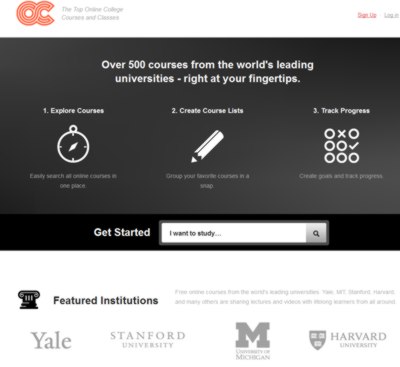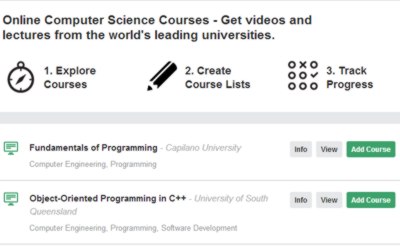| Online Computer Science and July MOOCs |
| Written by Sue Gee | |||
| Monday, 01 July 2013 | |||
|
Summer time and the learning is easy ... well in the sense that with online education you can do it at your pace and in you choice of place. And there is plenty of choice on offer. If you like to review all the options before choosing your the ones that suit you, you face a big task when it comes to open college courses. There are hundreds, with new ones being added at a fast rate.
Computer Science is one of the areas of study covered by OnlineCourses.com, formerly LectureFox.com. This website has set out to: aggregate the best free and open courseware for students and professionals, all in a conveniently searchable online courseware platform. You create an account with your email address and password and can then create lists of course you are interested in. There are currently around 100 computer science resources listed, including videos, audio lectures, and notes, all of them free. The courses selected are "college-level" and mainly provided by from universities in the United States, with and a much wider selection that the home page which lists four featured institutions - Yale, Stanford, Michigan and Harvard, suggests.
Once you've chosen an area of study you access the course exploration screen where you can click Info for a brief description of each course and View to access more details. Once you embark on courses the site helps you track your progress. OnlineCourses doesn't include MOOCs from Coursera or edX. Which raises the question of what distinguishes a MOOC from a series of video lectures which also has assignments and exams, such as Introduction to Computer Science: Programming Methodolgy from Stanford Engineering Everywhere. One difference is that you can make a start on one of these courses at any time - there's no start data and no schedule. This feature also applies to Udacity courses once they have finished their debut runs and they are counted as MOOCs. MOOCs also have a community aspect with forums to engage with other students and most would argue that a MOOC should also have ongoing support from the instructor and teaching assistants. However, students on a current Coursera MOOC, Model Thinking, which is currently in its fourth presentation, are beginning to suspect that there are no staff members monitoring the course at all and that it has been left on auto-pilot, even though this course is one for which there is a signature track, which means you can pay to obtain a verified certificate of completion. Coursera has three MOOCs starting this month, all of them beginning on July 1st. Tim Roughgarden's Algorithms: Design and Analysis, Part 1 is embarking on its fourth presentation. This Stanford-originated course covers several fundamental principles of algorithm design: divide-and-conquer methods, graph algorithms, practical data structures (heaps, hash tables, search trees), randomized algorithms, and more. The recommended background for this 6-week class, which has a workload of 5-7 hours per week, is the ability to program in at least one programming language (like C, Java, or Python); and familiarity with proofs, including proofs by induction and by contradiction. Some exposure to programming and the ability to read and write mathematical proof is the prerequisite for Coding the Matrix: Linear Algebra through Computer Science Applications presented by Philip Klein of Brown University. The idea behind this 8-week course, which has a workload if 7-10 hours per week is that: When you take a digital photo with your phone or transform the image in Photoshop, when you play a video game or watch a movie with digital effects, when you do a web search or make a phone call, you are using technologies that build upon linear algebra. The course description goes on to explain that linear algebra provides concepts that are crucial to many areas of computer science, including graphics, image processing, cryptography, machine learning, computer vision, optimization, graph algorithms, quantum computation, computational biology, information retrieval and web search and that linear algebra is built on two basic elements, the matrix and the vector. The class shows how the concepts and methods of linear algebra can be used in the context of computer science. Students will write small Python programs to implement basic matrix and vector functionality and algorithms, and use them for two-dimensional graphics transformations, face morphing, face detection, image transformations such as blurring and edge detection, image perspective removal, audio and image compression, searching within an image or an audio clip, classification of tumors as malignant or benign, integer factorization, error-correcting codes, secret-sharing, network layout, document classification, and computing Pagerank (Google's ranking method). How Google ranks webpages is also on the syllabus of Networks Illustrated: Principles without Calculus. This is a 6-week class taught by Mung Chiang and Christopher Brinton of Princeton University. This course, that has no prerequisites sets out to study a range of networks - from social platform such as Facebook to intenet technology. The distinctive feature according to the description is: rather than using heavy math, this course will only require basic arithmetic such as addition and multiplication. We rely on animations, analogies, and anecdotes as our pedagogical tools, in lieu of detailed equations. Two of 10gen's free courses introducing MongoDB are starting again in July. M102: MongoDB for DBAs taught by Dwight Merriman, one of the original authors of MongoDB, begins its fourth presentation on July 15th and M101J: MongoDB for Java Developers, which has knowledge of Java as a prerequisite and is taught by Andrew Erlichson and Jeff Yemin, begins its third presentation on July 29th. If you have taken, or are taking, any of these courses and would like to share your experiences use the comments or send me an email.
More Information
Related ArticlesJune Computing MOOCs and Open Courses May Computing MOOCs and Open Courses April's Crop of Computer MOOCs Computer Science MOOCs for March Free Online Computer Science Courses Starting February
To be informed about new articles on I Programmer, install the I Programmer Toolbar, subscribe to the RSS feed, follow us on, Twitter, Facebook, Google+ or Linkedin, or sign up for our weekly newsletter.
Comments
or email your comment to: comments@i-programmer.info
|
|||
| Last Updated ( Monday, 01 July 2013 ) |




